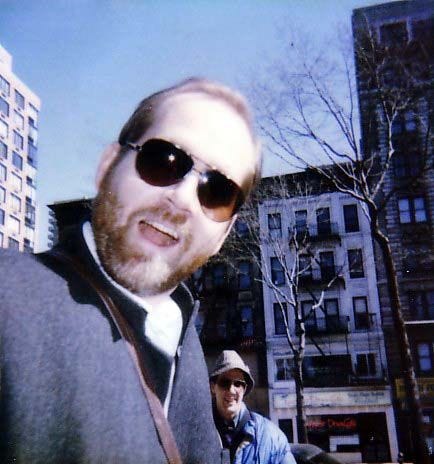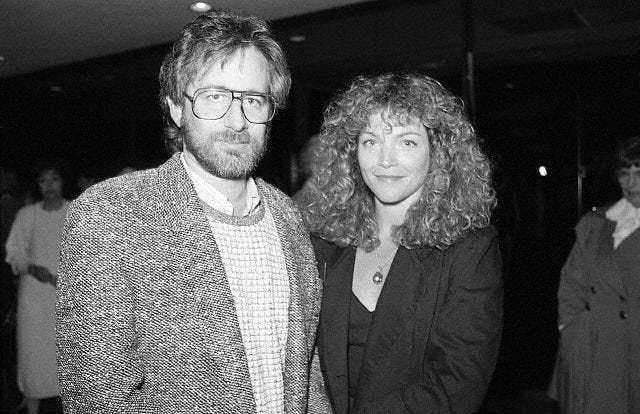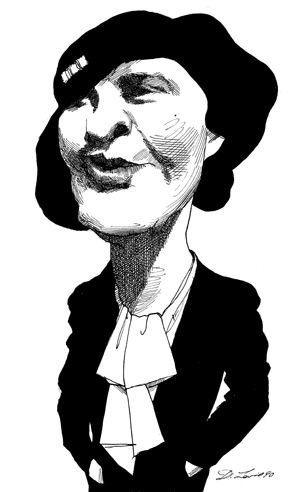New York, 1990
I don’t know how to write about it, how to remember it -- what had been gold turned black. In the year of my diagnosis, 1989, as I finished the draft of American Cassandra, life seemed to happen only at night. I was back and forth from Vermont to New York, Boston, and Syracuse, of all places, checking last details in Dorothy Thompson’s papers, flying and driving, always in the dark. While waiting for publication I went to Egypt on an expensive tour and even there, in my memory, it was nighttime: my first view of the pyramids from the Hotel Oberoi in Giza; my solo strolls in the back alleys of Luxor, away from the temples and tourists; my approach to the gods at Abu Simbel, just as the sun went down. At Aswan I had sex with two sailors in a felucca on the Nile, with a full moon rising, while my friend W., who was with me, brought stewards and cabin boys into the stateroom of our floating hotel, one after the other, ticking them off as if from a list he had made. We were pathetic white men exploiting Nubian workers in secrecy and shame.
How did I not know I was depressed? Was I just used to it? Did nobody ask? Or was it my sure and sardonic presentation that kept people from prying? In 1992 I reviewed Peter Kramer’s Listening to Prozac for The New York Observer, a book that exposed what the future would hold for tens of millions of depressed patients: a reprieve from despair through the blunting of emotion. This was before medical doctors began handing out anti-depressants like lollipops.
“Try as he might,” I wrote, “Dr. Kramer can't escape the feeling that something doesn't sit right with self-improvement on a chemical basis. Could it be, he wonders, that `diminishing pain can dull the soul?’” I rejected psychotropics as a mark of steel, a ludicrous pose for me, meanwhile finding ever more dangerous adventures in the night -- no Prozac, but lots of cocaine.
“You’re killing yourself, Pete,” I heard myself say, but I did nothing to stop it. These were my high-society and magazine days, glamorous on the surface. Tina Brown had purchased American Cassandra for excerption in Vanity Fair, having pronounced on reading it that Dorothy Thompson “sounds like a monster,” but plainly recognizing traits she could relate to. Another editor at the magazine deemed it worthwhile to develop projects for me after that, and when Tina was done asking, “But who is he? Who is he?” I found myself almost catapulted into Romania in the wake of the revolution there, covering the effort of the deposed King Michael to return to Bucharest from his exile in Switzerland. Romania had been devastated by that time, stripped of its resources by the Ceaușescus and their cohorts. My driver and interpreter saw me eating a tomato at Sinaia, site of the Romanian royal family’s summer retreat, and nearly fell from his chair. He hadn’t seen one in three years. He gasped as we walked through the murdered Ceaușescus’ villa in Bucharest, not bothered by the solid gold toilet fixtures so much as the working thermostats. “They could turn up the heat!” he cried, furious. Protesters were everywhere in the city, supporting this or that new party or idea in the run-up to Romania’s first “free” elections. “It’s really just the same people in different clothes,” Bogdan said. I stayed at the InterContinental with dozens of other Western journalists. Mostly we fed each other the news.
After that, it was Hollywood and comic relief. I’d been there before in 1986, when Anastasia was filmed for NBC, so I already knew about the emptiness of the place. Everything starts at “Fabulous! I love it!” and moves upward from there. I had been a paid consultant on Anastasia and was naive enough at the beginning to think that someone might actually consult me when they got around to filming. But there was just one conversation that I remember. I wrote a column about it later:
I might have guessed I was in trouble when the producers called to ask if Anastasia had ever had "boyfriends." They wanted to know who they were. They wanted to know how many there were. They wanted to know what I thought when they said that if she hadn't had any boyfriends they'd have to make one up.
"I want more romance," said Brandon Tartikoff, who at the time was head of entertainment at NBC. "When I think Anastasia, I think romance."
I won't go into detail about the adaptation NBC concocted from my work. Every writer thinks they get it wrong; this is nothing new. I'll only say that in my opinion, if they'd wanted Cinderella, they should have bought the rights from the Brothers Grimm. A script emerged from the hand of James Goldman, author of The Lion in Winter and, as it happened, Nicholas and Alexandra, the enormous turkey derived from Bob Massie’s book in 1971, a great bore redeemed only by Janet Suzman’s subtle performance as the Empress. (Full disclosure: Massie hated the movie too.) Goldman had complained and complained about the destruction of his N&A script at the hands of executives and film producers and the same thing happened now with Anastasia, to the point that he finally asked for his name to be taken off the credits. It wasn’t. A lot of money was in play:
I bowed to fate and did my best to keep my nose clean. I might have succeeded too, if they hadn't asked me to the screening at the Motion Picture Academy in Los Angeles. All expenses paid. Pool-side room. Caviar with Steven and Amy.
"Steven" is Spielberg, and Amy is -- or was then -- his wife, Amy Irving, who delivered a performance as Anastasia that was -- well, every journalist in Hollywood tried to get me to say nasty things about Amy Irving. Don’t ask me why because I don’t know.
“Peter," they chirped in their sunniest voices, "how do you feel about Amy's performance? Were you ... disappointed?"
I must have driven them crazy, because all I said was: "Gosh, I'm so excited to be here! I can't believe it! Look, isn't that ... Elke Sommer!” So they didn't get any poop about Amy from me. They left me alone pretty quickly, in fact, because I wore a tweed jacket and called myself Mr. Kurth and thanked the Filipino bellboys when they opened my car door for me.
And the funny thing was, I liked the movie, all four hours of it, putting aside everything I had ever known about Anna Anderson and the Anastasia case. It was brainless but a big hit, way high in the ratings, and it sold an awful lot of books. Sold them out, I should say, because Little, Brown, per usual, hadn’t thought it necessary to run another printing until after the fact. They did send me a bottle of champagne. I shot onto bestseller lists and fell off them just as quickly, grateful in the end that, because of this soapy two-part miniseries, Anastasia won a long life on the shelves:
I must say, Amy Irving couldn't have been nicer; and the service at the Beverly Hilton couldn't have been better; and there’s no greater rush, I’m sure, than the one you get when you walk into a room full of press and a thousand flashbulbs go off in your face and keep going off for as long as you’re standing there. It’s also a trip to be paged at the pool, as I was the next morning, after the premiere.
It was Howard Rosenberg, TV critic for the Los Angeles Times. “I have only one question for you,” he said. “Have they ever read your book?”
“Keep quiet,” I pleaded. “Nobody has to know.” A short time later Amy came in with her entourage and kissed me in public. That's all you need to make it out there.
Now, in 1990, with American Cassandra published to glorious reviews, I was hawking Dorothy Thompson to producers and actresses in L.A., while simultaneously exploring the life of Bob Hope for a proposed biography. I suppose it was the dangling of dollar signs that made me even think about doing that. An editor in New York had asked me if I would. I was “biographer of the hour,” he said, and could have my pick of projects. But in the end I found Hope so distasteful that I backed away. Anyone reading a book about him would expect at least something in it to be funny, but the only amusing thing I heard about Hope over two months’ of interviews came from his daughter Linda, who reported that as children, whenever their father left for the studio in the morning, she and her siblings would line up at the picture window of their big house in Toluca Lake and, as he stepped into his limousine, cry in unison, “Look! There goes Bob Hope!” It was hardly enough.
I was really in L.A. trying to sell Dorothy Thompson to the movies. How perfect she was – is -- for the screen, a woman of guts and glory, battling Hitler while struggling to balance the call of destiny with a failing marriage to a literary giant and the demands of an ambivalent sexuality. How many female movie stars were complaining then about the lack of meaty roles for women? I stopped counting because it’s a constant thing. I supposed that Dorothy would be a shoo-in and pitched her story as “A Star Is Born with Nazis,” forgetting that I was in a town that knows neither subtlety nor humor.
“They’re bad Nazis, right?” a producer said.
If I hadn’t been grinning to show all my teeth my chin might have hit the table.
“What?”
“They’re bad Nazis.”
“What?”
“I mean, we’re not supposed to sympathize with them, are we? We don’t want any of this `Summer of My German Soldier’ stuff, right? They’re bad Nazis?”
Quickly I remembered where I was.
“Oh, yes,” I said. “They are terrible Nazis. They are Hitler and the Nazis!”
Thus began the long road of American Cassandra to non-production in Hollywood. Producers came out of the walls and up from floorboards hoping to have a crack at it, many of them women, as I had hoped. Some were almost desperate to get it to the screen, but all of them failed. The book would be optioned many times — it is still under option. Scripts would be written, some decent, some terrible, but whenever the project came through to development it stalled, sputtered, and died. The reason? I’m loath to say it although I know it’s true. In Hollywood, world capital of froth and rubbish, Dorothy Thompson is thought to be “anti-Semitic.”
What a sad, stupid story it is. The woman who risked her life to defy Hitler; who spoke before Congress to urge a loosening of immigration quotas when Jews were turned away from American shores; who took up the bat for all the Jews of Europe and urged her colleagues to do the same, finally went to Palestine at the end of World War II and, looking around, changed her mind about the wisdom of establishing a Jewish state there. She had been a Zionist in good faith, who believed, with many others, that a Jewish “commonwealth” in Palestine would see Jews and Arabs living side by side in a sort of community garden, with no domination of one side by the other and no displacement of the Arab population. This, obviously, was not how the State of Israel came into being or how it endured under pressure along all of its borders. Dorothy visited Palestinian refugee camps and was horrified, blaming Western guilt over the Holocaust for the outbreak of a mass felony in Arab lands.
“Hitler’s persecutions have exacerbated the Palestinian question beyond the bounds of rationality,’ she insisted. She knew the Arab world would never accept a Jewish homeland if it was forced upon them. She knew the strategic importance of the Middle East and the risk after World War II of Soviet domination in the region. She knew, above all, that Western conscience could not be assuaged by displacing millions of innocent people for political ends. “It is a recipe,” she declared, “for perpetual war.” And of course she was right.
But “anti-Semitic?” Dorothy rejected the label and defied her critics, watching her career decline as a direct result of the stand she had taken. She was fearless. “I refuse to become an anti-Semite by appointment,” she wrote, noting always and everywhere that the distinction between a Jew and a Zionist – an Israeli – had been willfully blurred. “Really,” she said, “I think continual emphasis should be put upon the extreme damage to the Jewish community of branding people like myself as anti-Semitic. It is a little beneath the dignity of anyone with my record to deny such charges in public, so they just tend to make anti-Semitism more respectable than it otherwise might be.” She became too stubborn on the subject, in my view, too wedded to a cause that filled a giant gap for her after Hitler’s defeat. As a lover of Germany and the German world, too, she never fully grasped the magnitude or specificity of the Holocaust, referring to the Shoah always as “the atrocities.” But there was nothing dishonest about her support for the Palestinian people. She may be criticized on many fronts but not on sincerity or integrity, and not, as a humanist, for “anti-Semitism,” a libel still so potent that in 2023 she was denied the honor of having her name hung at the Overseas Press Club in Washington, when it begged to remember the contribution of women to foreign reporting – she who, more than any other woman of her time, had pioneered the role.
All this is too complicated for Hollywood, anyway, where the pitch line is what matters and stories are stripped to their barest outlines. Producers like to have the book they’re adapting on the table in front of them so they can pick it up and wave it around at script conferences; more than that I rarely saw. So I left. I had an assignment in Monte Carlo. "All I say is, don't let `em get you,” Dorothy wrote to Jimmy Sheean. “Keep your shirt on, your head on your shoulders, and remember we shall die anyhow. ... Don't join `em, brother, not either side of the maniac line-up. ... Oh, as so many a poet has said: Shit."
Illustration by David Levine for The New York Review of Books






so interesting!
damned if i dont recall your name from my decades in Vermont but i sense even with your worldliness and great career still retain like we all do its inimitable mark 😉
Peter Kurth. Addict that I am I want more.